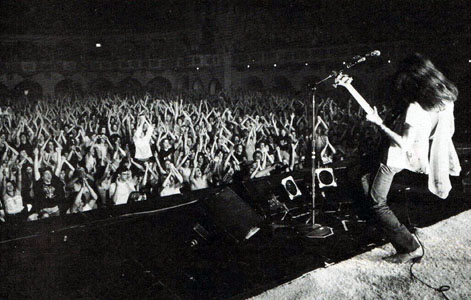Firm believers in rock & roll populism, Rush - Lee, guitarist Alex Lifeson, and drummer Neil Peart - have based an entire career on the unshakeable faith of fans who still believe in the louder things in life like crash-course guitar, a furiously complex but impenetrable beat, and Wagnerian bombast that pins you to the wall. And those fans don't review records. They buy them, more than enough to put gold and platinum copies of 2112, All the World's a Stage, and A Farewell to Kingson a wall in Lee's Tudor-style Toronto home. The band's sixth studio album, Hemispheres(Mercury), is likely to snare wall space of its own before long. But Lee, a soft-spoken brown-eyed sort whose shoulder-length brown mane and Barclay James Harvest sweatshirt distinguish him from his suburban neighbors, already has his modestly furnished home, five cats, and a mellotron in his living room to remind him that he is a successful '78 model rock star.
 "The only justification I need for what I'm doing with Rush is that we finish an album and we love it. Then we take it to our fans and they respond to it. If what we were doing wasn't right, we wouldn't be where we are. There may be ways of becoming bigger than we are, but I'm not complaining." Nor is he complaining about the way Hemispheres turned out. Pulverizing production, impeccable playing, and an artful marriage of timeworn power chording and compositional tricks from the Yes/Genesis grab bag mark the album as the band's most impressive recording to date. Whatever your reservations about the Olympian scope of Neil Peart's storyline for the side-long title track (the conclusion of the Cygnus X-1 tale from Farewell), you can't argue with the Nordic-like Lifeson's expert negotiation of the rhythmic twists and turns, mustering both the blaze of Page and the bluster of Beck, while Lee narrates with an intense banshee wail.
"The only justification I need for what I'm doing with Rush is that we finish an album and we love it. Then we take it to our fans and they respond to it. If what we were doing wasn't right, we wouldn't be where we are. There may be ways of becoming bigger than we are, but I'm not complaining." Nor is he complaining about the way Hemispheres turned out. Pulverizing production, impeccable playing, and an artful marriage of timeworn power chording and compositional tricks from the Yes/Genesis grab bag mark the album as the band's most impressive recording to date. Whatever your reservations about the Olympian scope of Neil Peart's storyline for the side-long title track (the conclusion of the Cygnus X-1 tale from Farewell), you can't argue with the Nordic-like Lifeson's expert negotiation of the rhythmic twists and turns, mustering both the blaze of Page and the bluster of Beck, while Lee narrates with an intense banshee wail.



